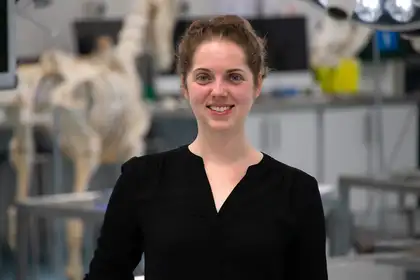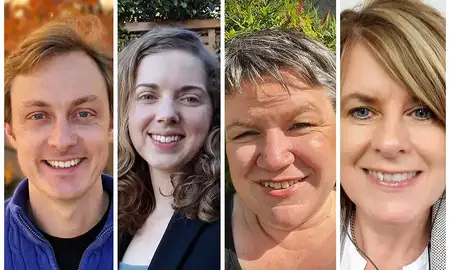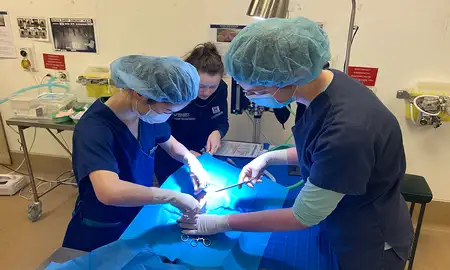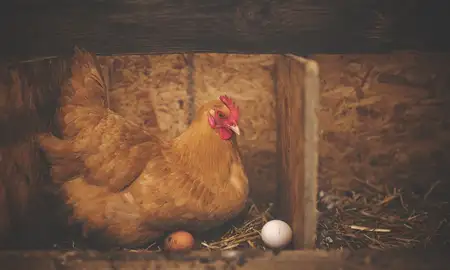
Associate Professor Carolyn Gates.
The awards, run by Ako Aotearoa National Centre for Tertiary Teaching Excellence, recognise and celebrate tertiary educators who excel in their commitment to teaching and providing exceptional support to tauira (students). They are the most recognised and respected awards for tertiary education in Aotearoa New Zealand.
Dr Gates is one of nine awardees to be recognised, and will be celebrated at a virtual ceremony in November.
There were six inaugural categories for the 2022 awards that highlighted some of the important challenges currently present in tertiary education. Dr Gates, an Associate Professor in Veterinary Epidemiology and Education, was successful in the category of ‘Advancing approaches to, and the outcomes of, work-based learning’.
Her work with veterinary students has been regarded as innovative in how she utilises novel techniques to enhance their learning. These techniques include designing inexpensive models for teaching surgical skills and creating online case scenarios to supplement real-world clinical experiences.
Dr Gates says she’s honoured to receive this recognition.
“I’m grateful for the opportunity this award has provided to showcase some of the exciting teaching initiatives at the veterinary school that are helping to better prepare new graduates for the challenges they will face in clinical practice.”
She’s also grateful for her students, who she says have helped her grow in her teaching.
“It’s surprising how much I have learned from my students and how much they’ve challenged me to change the way I approach my roles as a researcher, educator, and clinician.”
Her colleagues have described her enthusiasm for teaching as legendary and her positive impact on her learners as profoundly significant. Dr Gates takes the student-centred learning approach one step further, saying one of the most important skills veterinary students can be taught is how to teach themselves and others.
“So much of our job as clinical veterinarians revolves around expanding our own knowledge about animal health and sharing it with our clients to help them achieve the best outcome for their animals. My teaching is geared towards providing students with real and simulated clinical experiences that allow them to gain confidence in their role as emerging educators,” she says.
Dr Gates’ impact extends beyond the classroom into clinical practice and charity work, including the establishment of the Massey-SPCA Desexing Clinic in 2017. The clinic performs over 1,000 cat desexing surgeries each year with a team of around 350 student volunteers who rotate through different roles to gain valuable hands-on experience.
Dr Gates, as programme coordinator, says it has been exciting and rewarding to watch it evolve over the years.
“The clinic’s current success is absolutely a credit to the large team of volunteers who have worked hard to ensure that the clinic provides students with a safe and supportive learning environment, while simultaneously providing a valuable service to the local community.”
In 2018, Dr Gates was the recipient of the Massey University Early Career Research Medal, as well as the International Society for Veterinary Epidemiology and Economics (ISCEE) Emerging Scientists Award, recognising excellence in her subject matter expertise. This year, she was a winner of the Vice-Chancellor’s Teaching Excellence Awards and was acknowledged as an excellent scholar, teacher, and colleague.
Find out more about Te Whatu Kairangi – Aotearoa Tertiary Educator Awards here.
Related news
Vice-Chancellor's Teaching Excellence Awards celebrated virtually
Exceptional teachers across Massey University were honoured at the virtual Vice-Chancellor's Teaching Excellence Awards ceremony in February 2022.

Desexing clinic reaches significant milestone
A Massey University programme that provides highly subsidised desexing surgery for cats has reached a milestone: 2000 surgeries.

Backyard poultry keepers sought to help design national poultry health information system
Improving the health and welfare of backyard poultry populations in New Zealand is the aim of a new project being led by Associate Professor Carolyn Gates from Tāwharau Ora – School of Veterinary Science.
